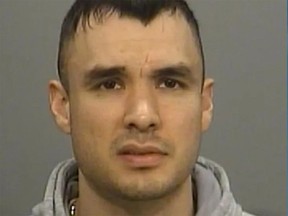
A Hamilton man wanted by police for the murder of two people needed to be arrested as soon as possible even if he was suicidal and confined to a hotel room, a coroner’s jury was told Monday.
Advertisement 2
Article content
The inquest is examining the circumstances surrounding the Nov. 3, 2019 death of David Thomson. The 33-year-old died of a self-inflicted gunshot wound in a Brantford hotel room as Hamilton police officers tried to negotiate his surrender.
Article content
Thomson was wanted in connection with the deaths of Cheryl Nicholl, 32, and her boyfriend Donald Lowe, 62. Their bodies were found in their Hamilton townhouse late Nov. 2, 2019. Investigators tracked Thomson to a room at the Days Inn in Brantford.
Corbin Cawkell, the lawyer representing Thomson’s family, asked Sgt Andrew Coughlan of the Hamilton Police Service why the suspect had to be arrested at that time when police had information Thomson was suicidal.
“That is information that we need to know, but we can’t back off of police investigations anytime someone says they’re suicidal,” Coughlan, one of several officers who was at the scene during the incident, said. “It’s something we need to be aware of and try to work through.”
Advertisement 3
Article content
Coughlan, in response to questions from inquest counsel Shruti Ramesh, said the goal was to arrest Thomson immediately “for the safety of everyone.”
Coughlan was the second witness to testify at the inquest, which is slated to last three days.
The inquest is expected to examine a number of issues including police training and the circumstances leading up to Thomson’s death.
During the first day of testimony, jurors were told that Thomson “was erratic” and it was believed he might kill himself. He was also armed with two handguns.
The inquest heard that police were led to the Days Inn by Lee Doolittle, Thomson’s father, who told police that he had rented a room for his son.
Testifying on Monday, Doolittle said he had not been a part of his son’s life while his son was growing up. They met later through a chance encounter, started spending time together and became close.
Advertisement 4
Article content
Doolittle said his son had mental health issues and also developed physical health problems. But his son never shared details of his physical affections with his father.
“Since Nov. 3, 2019, not one single day has passed that I haven’t thought about David,” Doolittle said. “Sometimes I wonder how I have any tears left.
“I’m told it will get easier with time but that is a lie.”
Speaking about the night of Nov. 3, Doolittle said police prevented him from going to the hotel.
“I asked many times if I could go to the hotel where he was at but was repeatedly told that I couldn’t go there,” Doolittle said.
The inquest also heard from Sgt. Alan Ing of the Hamilton Police Service, who explained why family members are initially kept from speaking to a loved one in such a situation.
Police need to maintain control of the situation for the safety of everyone involved including the public, police and the suspect, Ing said.
“We don’t know what he (the person) is going to say,” Ing said. “Theoretically, he could say ‘the police are coming you need to leave’ or ‘police are coming get ready for them.’
“It was a matter of control for our safety as well as Mr. Thomson’s safety.”
Ing said every situation is different and sometimes a situation can progress to the point where bringing in a father or a family member can become an option.
twitter.com/EXPVBall
Article content